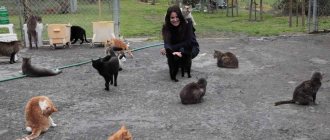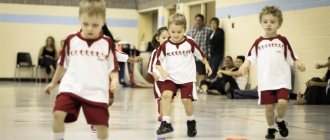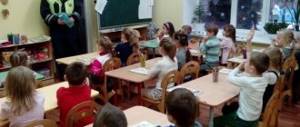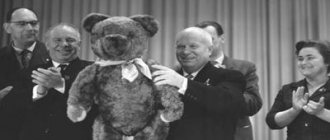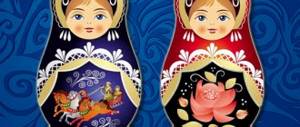Attention! We also offer free downloads for children of our game programs: Guess the baby animal and Guess the flower from the picture and Arithmetic in pictures.
Parents often wrote to us and asked us to come up with simple and at the same time interesting topics for the projects of their children attending kindergarten. Indeed, now in preschool educational institutions children often engage in observations, conduct small experiments and research.
The presented topics of projects in preschool educational institutions are developed for children of the middle group, senior group and preparatory group of kindergarten, and are carried out with the help of teachers and parents. Project topics are designed for children aged 3, 4, 5 and 6 years and older.
- Project topics in the junior group
- Project topics in the middle group
- Topics of projects in the senior group
In the process of research work, after choosing an interesting project topic in kindergarten according to the Federal State Educational Standard, preschoolers study the selected object in more depth, observe pets, flowers, plants, insects, carry out environmental projects and, as a result of their research, give answers to seemingly simple questions for adults .
It is very important for educators to choose a topic for a children’s project for preschool students that is simple, understandable and very interesting, because the main thing is to involve the child in kindergarten in research activities, teach them to observe, understand and draw their first conclusions. It would seem that elementary things, phenomena and processes within the framework of project activities with children can surprise and interest.
- Project topics in the preparatory group
- Topics of mini-projects in preschool educational institutions
The research topics for preschoolers developed for kindergarten are relevant; they can be used as project topics in preschool groups to conduct interesting and exciting classes, research activities on the site and on excursions outside the preschool educational institution.
Preschoolers of the middle and senior groups of preschool educational institutions, who have chosen topics for research projects and completed creative work in kindergarten, can take part in children's competitions “I am a researcher”, “Young researcher” and many other research and creative competitions.
Favorite animals
Topics for projects in kindergarten about animals:
Dolphin is a doctor?! Why does an elephant have such a long trunk? Why does a giraffe have a long neck? Why does a cat need a mustache? Why does a sheep need so much wool? Why does an elephant have big ears? Why does a hedgehog need needles? How do bats see? How to learn to understand a horse? What a hedgehog he is. Who lives in my forest? Who lives in the hole? Who lives under the tubercle? Who said meow? Who are seals? Who is this squirrel? Forest inhabitants of our region. The fox is a red-haired cheat. Squirrel's favorite treats. Mom, I want a dog! My favorite pet. My kittens My favorite rabbits. My favorite fluffies. My furry weirdos. My pet. My cat Vaska My beloved Mr. Keys. My cat became a mother. My favourite dog. My pet turtle. Habits of my cat Timka. Why do frogs croak before it rains? Why does the bear love to sleep so much? Why doesn't my cat like dresses? The kindest animals are dolphins. A dog is a person’s friend and helper. I have a Guinea pig. The amazing world of dinosaurs. Hamster, hamster, hamster! Fluffy hamsters. This fabulous frog.
Relationships between parents and children in the family
Bibliographic description:
Relationships between parents and children in the family / N. F. Abramenkova, V. A. Aslanidi, M. V. Lukina [etc.]. — Text: immediate // Aspects and trends of pedagogical science: materials of the III International. scientific conf. (St. Petersburg, December 2017). - St. Petersburg: Own publishing house, 2020. - pp. 186-189. — URL: https://moluch.ru/conf/ped/archive/273/13334/ (date of access: 10.10.2020).
From the moment the baby is born, the development of the relationship between parents and child begins. Relationships with young children are usually easy. The child is very dependent on his mother, she always takes care of him. There is a warm and strong connection between them. Parents and children are connected by daily and frequent communication with each other. Such contacts contribute to the development of trust, spiritual unity, consistency of actions and aspirations in life. Relationships are based on feelings of parental love and care, feelings of motherhood and fatherhood, and children’s attachment to their parents. In order to never lose trust and warm feelings for each other, parents must support the child in all the difficulties and difficulties that arise. But often this does not happen. It is very difficult for an adult, being at home, to abandon his problems and switch his attention to the child. Hence the misunderstanding, the child’s feeling of resentment, and dissatisfaction with his relationship with his parents. The tender and fragile soul of a child requires special careful treatment, and most importantly, every minute he must see, realize, feel that he is loved for who he is. According to the Russian psychologist Yu. B. Gippenreiter, a child should more often hear the words: “It’s so good that you exist in the world!”, “We are so glad to see you!”
The baby must be sure that he is very needed in this world. He needs to know that there are always loving and understanding adults nearby.
The world of an adult and the world of a child are two universes, but in a family these two worlds must not only exist, but interact with each other. “Children are the world’s gentle riddles, and in the riddles themselves lies the answer...” these lines by M. Tsvetaeva have a deep meaning. People are always happy to see little children. Their appearance brings a lot of smiles and attention. Children are a strong source of happiness. But a child is the greatest mystery; he is not like adults, because he thinks, feels, perceives his surroundings differently from them. Adults need to know and understand this.
Unfortunately, in recent years there has been a replacement of true values with false ones, a distortion of morality - increasingly separating society from that lofty and eternal thing on which life has always rested. According to the concept of humanistic psychology (A. Maslow, K. Rogers and others), a person’s desire for security is one of the important needs of life. The protection of the rights and interests of children in Russia is reflected in the Constitution of the Russian Federation, the federal laws “On Education of the Russian Federation” and “On Basic Guarantees of the Rights of the Child in the Russian Federation”, in Decree No. 701 “On the National Strategy for Action in the Interests of Children for 2012–2017”. The primary institution for child protection is the family. Only together with your family can you solve the great task of raising a worthy, successful, spiritually and physically healthy person.
For a child, the family is the main environment for living, development and psychological formation. It is in the family, during early childhood, that a child learns to understand the world, comprehends the basic mechanisms of cognition, the foundations of relationships between people. It is in childhood that the basic skills and abilities and psychological qualities of a person’s character are laid down, which he only develops throughout his entire subsequent life. The institution of family is extremely important for a child, since the period of childhood is characterized by partial isolation from society. Parents for a child are the main source of understanding human relationships (relationships between parents and children, relationships between parents and the older generation). The development of a child’s personality is influenced not only by the parents’ relationship with the child himself, but also by the parents’ relationship with each other. So, if a child receives enough attention from his father and mother, both parents take an equally active part in his upbringing, the child is surrounded by care and love. But it happens that tense relationships arise between the parents themselves, and this situation will be reflected in the child’s future life. The family atmosphere can have an impact on personal development (psychological problems, internal contradictions, complexes, fears), on the formation of his relationships in society (gravitation towards loneliness in order to avoid relationship problems). It can be argued that an unhealthy family atmosphere and difficult relationships between parents and children will be reflected in the future life of the child. It is a mistake to think that a child does not perceive the relationships of adults, that he is unable to understand most of the problems of adult life. As a rule, a child is more susceptible not to situations, conflicts, objects, circumstances, but to the emotional background that accompanies this or that situation in his life. It should be understood that a child is a kind of imitator; he adopts the basics of his character, behavior, and attitude towards people from his parents, moreover, beginning to comprehend the basics of relationships from infancy (tone of voice in conversation with certain family members, clear patterns of behavior in certain situations ). As a result, by adulthood, when the child exhibits his first personality traits, parents are faced with nothing more than the manifestation of their own character traits, manners and styles of behavior.
The relationship between parents and children is largely determined by external factors, which include material well-being, living conditions, and the social status of the family. The internal factors that determine the relationship between parents and children include the culture and upbringing of parents, spirituality and morality, awareness of the spiritual value of family, marriage, and relationships between loved ones. The relationship between parents and children is largely determined by the family’s lifestyle, well-being and prosperity, a sense of calm and confidence, security of each family member, his desire to support and develop the family. Modern mothers and fathers try to give their child something that will make him wealthy, protected, and give him an advantage over others. And they care very little about the child’s inner world. Conversations with children about their time at home showed that children are left to their own devices. Of course, parents watch them from the side, but children are alone in their actions. Most often, the child is given a tablet, coloring books, and many toys. But this quickly gets boring, and children try in every way to attract attention, since they need communication with their parents. Parents do not always strive to understand the motives of the child’s actions or support his interests and abilities. Having analyzed our observations of the relationship between parents and children, we came to the conclusion that parents do not have knowledge of the theoretical foundations of instilling independence in a child, do not know effective methods of instilling independence in a child in the family, do not attach importance to creating a favorable environment for the child to demonstrate independence, and do not pay attention to attention to the child’s emergence of emotional anticipation of the results of activities. Parents do not know how to build relationships with the child, often evaluate the child’s activities inadequately, do not support his self-esteem, have difficulty determining the child’s emotional state, often choose inappropriate ways of communicating with him, and do not know how to establish a partnership with the child. Having determined the degree of difficulty in the relationship between parents and children, we decided to help parents in properly building relationships with their children. Master classes were held for joint leisure of parents and children. Parents really liked the instructions on how to conduct partner and outdoor games. With the help of a psychologist, we held a series of lectures and conversations about the need to change relationships with children.
Parents were made aware that children have their own views on life, that they say something that is often incomprehensible. This all needs to be assessed and taken seriously. If a child says something stupid, then there is no need to laugh or swear. On the contrary, you need to think about it and, if necessary, try to direct it in the right direction. You cannot laugh at a child or not listen to him. When a child sees that they are listening to him and trying to understand him, he begins to open up because he sees that he is accepted for who he is. Such a relationship between parents and children is the beginning of proper upbringing. If parents treat a child this way, then he begins to feel protected, and in difficult times he will turn to his parents. This behavior of parents is the beginning of respect for children. When a child sees that his parents fully understand him, he will not be afraid to come up and ask a question. At such a moment, parents need to put aside all their affairs and answer the question posed. If parents listen to the child and answer questions, then they have the opportunity to become an elder or mentor for the child, whom they can always turn to and listen to wise advice. It is necessary to share your life experience and accumulated knowledge to make it easier for your child to cope with problems. You should not tell your child exactly what to do in various situations; it is enough to simply be interested in and take part in the child’s life so that he learns to overcome difficulties on his own and gains his own life experience. It is recommended to hug your beloved child more often. In an embrace he feels love and protection. Children of this age need tactile contact.
Research by child psychologists shows that children need at least eight hugs per day. The child needs to be praised. The more often the better. Flattery and fanaticism in this matter will be unnecessary - the child will immediately sense false notes. In the theory of raising and teaching children of this age category, it is believed that praise increases self-esteem and also motivates children to do good deeds and self-improvement. Preschoolers should grow up to be optimists. Children need to be taught to perceive the world around them positively, since the world treats positive people favorably. Any situation, even an unpleasant one, should become a lesson and provide life experience. Adults need to be interested in the child’s life, ask him about life outside the home, about relationships with peers. A child must learn to trust his parents from a very early age. A positive aspect of such communication is teaching the child conversational speech and the ability to conduct a dialogue. You need to talk a lot with children. Any education begins with words. He must learn to hear an adult and be able to express his problems. Children should be instilled with a sense of responsibility. Due to his age, he does not always understand what it means to be responsible for his actions, for the assigned work. Teach him this in the family. How to teach? Only by your own example. Let the baby be responsible for cleaning his things, let him learn how to care for pets. Growing up, he will know that in life any person has to be responsible for something for other people, for his own affairs and actions.
It is necessary to develop a child’s desire to learn new things, to satisfy and encourage his desire for knowledge. Let your child play various useful developmental games, look at encyclopedias, read interesting books to him, stimulate his desire to learn new things. “A real understanding of social experience is possible only if the child is included in problem situations, where he himself acts as a subject, sees the issues and problems that other people have worked on and his contemporaries are working on, and he himself is included in the solution process, in the general flow of creative searches and efforts . Without such a child’s independent involvement in creativity, there can be no true understanding or adequate assimilation of any fragments of human culture, as created and reproduced continuously by the process of objective activity of people,” N.P. Batishcheva comes to this conclusion. (1905).
The most important thing is to love your child, no matter what he is. Love him capricious and moping. Do not provoke or blackmail your baby with love. As a result, children begin to develop complexes and fear of losing their mother’s love. We are all responsible for the children we raise through our own actions, our own views on the world. And it is a great happiness for a child to go through life with a kind and wise person, be it a mother, father or a good teacher, who will help the child be what he is destined to become from the moment of birth. After all, every child has the right to be happy today, tomorrow, and not in the distant future. And the task of teachers of the social pedagogical department is to assist parents in creating trusting relationships and mutual understanding in the family.
Literature:
- https://detstrana.ru/article/deti-3–7/vospitanie/vzaimootnosheniya-mezhdu-roditelyami-i-detmi/
2. Minina A. V. Structure and content of parents’ pedagogical competence in instilling independence in preschool children / Education. The science. Innovation: Southern Dimension. Rostov-on-Don: IPO SFU. 2013. No. 2 (28). pp. 93–98.
3. Sergeiyurev.com - a blog about self-development, spiritual psychology and creativity.
Key terms
(automatically generated)
: child, parent, parental relationship, attitude, parental attitude, family, life experience, child's life, children's interest, family member.
Plants
Topics of research work for preschoolers about plants:
Oh, potatoes, potatoes! Pharmacy under your feet. Be nature's friend A Christmas tree was born in the forest. Cornflowers We grow beans at home. Why does mom need beans? What does the bean cling to? The mystery of the sequoia. Thrifty stems. How to grow an oak sprout at home. What plants “can” predict the weather? Little potato Beauty - potato Where do the roots go? Medicinal plants. The forest is a protector and healer. My favorite fruit is banana. Carrots are simply delicious! My favorite berry is Cranberry. New Year's elegant beauty. Vegetable garden on the window. Cucumber in the garden, how are you doing? Dandelion is my little sun. First spring flower. Useful tops and roots. Why do flowers smell? Journey of Señor Tomato Seeds How old is the tree? The amazing world of plants. Violet for mom Flowers from our kindergarten. What kind of berry is strawberry? What is leaf fall? What do we know about sunflowers? Miracle nuts I found a lily of the valley I found a snowdrop. Berry alphabet.
Amazing insects
Topics for projects for preschoolers in kindergarten about insects: Butterflies are beautiful and interesting! Why do bees need honey? Why do mosquitoes bite? What kind of ant life is it? What is the use of ants? My observation of a butterfly. Ants and their kingdom. One day with an ant. Where does honey come from? Fluttering flowers Why do butterflies have colorful wings? Secrets of the bee family An amazing creature is the ant. Amazing butterflies. The amazing world of insects. What does a worm smell? What's on the menu for insects today? I looked down on a simple worm.
Project “Open kindergarten - open parents”
Project objectives: selection and testing of active forms of interaction with parents of preschool children for effective cooperation between preschool educational institutions and families; create conditions for creative self-expression and self-realization of subjects of the educational process through joint child-parent events; analyze the results, identify the effectiveness and possibilities of transferring this experience.
The topic of the project was not chosen by chance. At the present stage, kindergarten is gradually turning into an open educational system: the pedagogical process of a preschool institution is becoming more free, flexible, differentiated, where teachers focus on cooperation and interaction with parents.
Working with parents is one of the most important aspects of the activities of preschool educational institutions. The forms of interaction with the family used by the teaching staff of the Solnyshko Kindergarten show positive results. But the characteristics of a modern parent force us to look for more and more new forms of active interaction with the family to involve them in the educational activities of a preschool institution. Therefore, the conceptual idea of project activity is closely related to the radical restructuring of work with families in preschool educational institutions: the transition from monological traditional forms of work to dialogue, reflection, and the involvement of parents in a variety of joint activities with children.
We assume that this approach will make teachers like-minded people, raise the psychological and pedagogical competence of parents, and also allow kindergarten teachers to use innovative forms of active interaction with the family in their work.
The problem of interaction between kindergarten and family has always been relevant. Relevant because the participation of parents in the lives of their children helps them see a lot, and also because all parents are different, they, like children, need a special approach.
Based on the observations of teachers, as well as from conversations with parents, we made the following conclusions: you don’t often see parents at informational events; more parents are attracted to entertainment events. Basically, they are only interested in the child’s nutrition; they believe that kindergarten is a place where they only look after children while parents are at work. And we, teachers, very often experience great difficulties in communicating with parents for this reason.
Another feature is the psychological aspect. Reduced free time for parents and overload at work lead to increased irritability, fatigue, and stress. Parents transfer their emotions to their children. The child finds himself in a situation of complete dependence on the mood, emotions and reactions of his parents, which affects his mental health.
Awareness of this helped to identify the problem: - one of the main reasons for the lack of activity of the kindergarten in involving parents in the educational process is the lack of a model of activity that includes mutually interesting forms of cooperation, involving parents in the educational process, as well as a space where parents could realize your potential.
Traditional forms of work do not always bring positive results. Under existing conditions that are adequate for organizing cooperation with parents, active forms of work that allow increasing the pedagogical competence of parents are not sufficiently used. Therefore, we need to look for new forms and fill them with pedagogically effective content.
3. Explanatory note. This project is aimed at changing the very philosophy of interaction between kindergarten and family: on the one hand, kindergarten becomes an institution of comprehensive support and promotion of the development of parental competence, on the other hand, cooperation between parents and preschool institution is considered as a prerequisite for ensuring the full development of the child. In the process of implementing the project, there is a transition from the concept of “working with parents” to the concept of “interaction”; there is a search for a common language of contact and mutual understanding, recognition of each other’s strengths and weaknesses. Interaction is a way of organizing joint activities, which is carried out through constructive communication. Preschool institutions and families should strive to create a single space for the comprehensive development of the child.
The novelty of the project lies in the creation of a model of effective interaction between the institution and the child’s family and the involvement of parents in the educational process of the kindergarten as full subjects of activity.
A feature of this project is an integral part of the teacher’s activity in introducing innovative forms of activity within the framework of the work of a preschool educational institution, in which the nature of parent-child relationships is revealed, problems and tasks are identified, and ways of implementing these tasks in a variety of activities with children are built.
Project type: short-term, practice-oriented, collective.
The goal of the project: to create and introduce into the educational process of a preschool institution a model of interaction between teachers and families of pupils, involving them in a single educational space as full-fledged subjects of activity.
Project objectives:
- selection and testing of active forms of interaction with parents of preschool children for effective cooperation between preschool educational institutions and families;
- create conditions for creative self-expression and self-realization of subjects of the educational process through joint child-parent events;
- analyze the results, identify the effectiveness and possibilities of transferring this experience.
Project participants: students and their parents (legal representatives), teaching staff of the educational institution.
Conditions for the implementation of the project: interest of children and parents, regularity and systematic work.
Project implementation period: January 2020 – March 2020.
Basic principles of organizing work with families:
- openness of the kindergarten to the family (each parent is provided with the opportunity to know and see how his child lives and develops);
- cooperation between teachers and parents in raising children;
- creation of an active developmental environment that provides unified approaches to personal development in the family and children's team;
- establishing trust and partnerships with parents;
- differentiated approach to different families, taking into account their individual characteristics.
The project is being implemented in two main areas of interaction with families:
- Increasing the level of pedagogical competence of parents through parent meetings, oral journals, parent corners, moving folders, group consultations, individual conversations, coaching sessions, parent living rooms, round tables.
- Involving parents in the work of the kindergarten through the organization of leisure activities using non-traditional forms.
Predicted results and criteria for their evaluation: The main criterion for evaluating results is feedback from parents; “feedback”, exhibitions. Possible risks: not all parents will be active.
In the process of implementing project activities, the following results are expected:
- the joint work of the team of the Solnyshko Kindergarten with the family will contribute to the creation of a unified educational space for all participants in the project activities;
- openness and accessibility of preschool educational institutions for parents and the public;
- parents will turn from “observers” into active participants in the educational process;
- increasing the level of pedagogical competence of parents in matters of education and development of preschool children through visual and informational support for the family;
- creation of a modern model of interaction between preschool educational institutions and families.
Conclusion. Thus, the creation of a new model of interaction between preschool educational institutions and families, based on the introduction of innovative methods and forms into the activities of the institution, will help achieve high results in working with all subjects of the educational process.
Work on interaction between the teacher and the family should contribute to: creating a positive emotional environment of communication between children, parents and teachers;
activation and enrichment of pedagogical knowledge and skills of parents; improving the psychological, pedagogical and legal culture of parents; development of versatile abilities of children and parents in joint activities; establishing continuous connections with children of preschool institutions and their parents. For the full text of the material “Open kindergarten - open parents” project, see the downloadable file
. The page contains a fragment.
| Author: Lapshova L.V., Vaganova S.F. → Publisher 05/10/2018 0 6764 409 | Comment |
Thank you for your mark. If you want your name to be known to the author, log in to the site as a user and click Thank you again. Your name will appear on this page.
Login | Registration
Have an opinion? Leave a comment
Why why?
Projects on the topic why:
Why is the sea salty? What is the use of paper? Where is the hottest summer? Why are there so many holes in the pipe? What is the drum made of? What is transport like in the city of the future? How to see the time? When is summer in the Arctic? Who lives in the egg? Where did the light come into our house? Why is there little water in the desert? Why is it always damp in the tundra? Why is the light bulb shining? Why does a kite fly? Why doesn't the sun set in the Arctic in summer? Why is the pillow soft and the floor hard? Why do you want to draw on wallpaper so much? Why does the sandwich fall down like a sausage? What is more convenient to write? What is cheese? What is in the starry sky? What is a project? What is a shadow and where does it come from?
